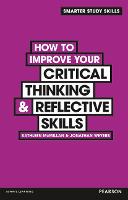Critical and analytical thinking skills
The process of breaking down complex information into components to analyse interpret evaluate and construct reasoned arguments in order to solve a problem or reach a conclusion.
It involves being able to discern various ways in which information is presented in the literature and at times to be able to process it in a way that takes into account the strengths and limitations of each approach.
Critical analytical thinking is a key part of university study. Many first year students receive comments such as 'not analytical enough' on their early assignments. You will find that you develop your critical and analytical skills as you go through university. In brief, this means looking very closely at the detail and not taking what you read or hear for granted.
Here are 7 key points:
Identifying the main line of reasoning in what you read or write
- What is the main argument or line of reasoning?
- Is the line of reasoning clear from the text?
Critically evaluating the line of reasoning for what you read or write
- Note any statements from the text which strengthen its line of reasoning or prove the argument.
- What statements, if any, undermine the argument?
- Are points made in the best logical order?
Identifying hidden agendas in your sources and in your own writing
What hidden agendas might the writer have that might make you question the contents or conclusions of the passage? Consider what they might hope to gain through writing this piece.
Evaluating evidence in the text
- What kinds of evidence or examples does the writer use? How reliable and useful is this evidence?
- Does it really support the argument? Is the evidence strong enough?
- Is the data up-to-date?
- Does the text use reliable sources? What are these? What makes you think they are or are not reliable?
Looking for bias
- Do you think there may be any bias in the text? Give reasons and examples.
- Comment on any statistics used. Are these likely to give a true and full picture?
- Does their writing reflect a political viewpoint?
- Who might disagree with the writer
Identifying the writer's conclusions
- Does the evidence support the writer's conclusions?
- Does the line of reasoning lead you to make the same conclusions?
Critical skills when writing
Work out early on what your conclusion is and write this down where you can see it easily. Use this as a guide for what to read, what experiments to run, and what examples to use.
- Apply the same rigour to your own writing as you do to analysing source materials.
- Before you begin your main piece of writing for an assignment, write your conclusion on a piece of paper and stick this at the top of the computer. Keep referring back to this to ensure that all of your writing leads towards this conclusion.
Sources
thestudyspace
Critical and analytical thinking skills
betterup
Critical thinking is the one skillset you cant afford not to master
Indeed
What Are Critical Thinking Skills and How Are They Used

More articles in this category:
- Doing Social Science Research
- Planning your Social Science Dissertation
- Seven tips for exam revision
University of Salford, Student Support
For more information and support on this topic from the University of Salford - please click here
Suggested reading
How to Improve your Critical Thinking & Reflective Skills
Paperback
McMillan, Kathleen; Weyers, Jonathan
WAS £13.99 SAVE £2.10
£11.89
View


